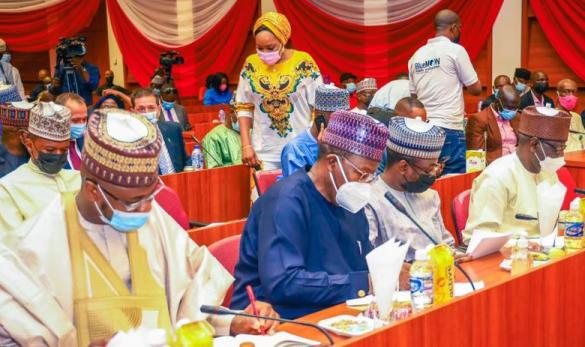The Office of the National Security Adviser (NSA) has expressed concerns over potential security risks from the deployment of 5G network even as the Minister of Communications and Digital Economy, Dr. Isa Ali Ibrahim Pantami and other telecom stakeholders allayed the fears of Nigerians on the deployment of fifth generation (5G) of global system for mobile GSM technology in Nigeria

Pantami and the experts, while speaking this week in Abuja at a one-day investigative public hearing on the present status of 5G network in Nigeria and its technological impact on Nigerians, clarified that there is no known scientific evidence till date suggesting that 5G poses any risks to public health and safety.
The one day hearing was organised by Senate Joint Committee on Communications, Science and Technology, ICT, Cybercrimes, Primary Health and Communicable Diseases. Part of the hearing is to address the controversies over possible health hazards of 5G and help to set the roadmap for Nigeria’s eventual launch of commercial 5G services.
According to the NSA, Maj.-Gen Babagana Monguno (rtd.), the 5G technology offers a wider clandestine window for eavesdropping, espionage and cyber attack all of which could potentially compromise national security if protective measures are not put in place before network operators commercially roll out 5G services.
The NSA who was represented at the hearing by Director of Communications, Office of the National Security Adviser, Bala Fakandu, said his office had expressed these fears to the Nigerian Communications Commission (NCC) at the initial trial of the 5G technology in 2019.
Pantami assured that Nigeria was moving in the direction of commercial launch of 5G services and announced that his ministry was finalising plans to present a draft national policy on the 5G network at the Federal Executive Council (FEC) for consideration. The FEC, chaired by President Muhammadu Buhari, is the country’s highest decision making organ.
The heads of agencies under the ministry, who were present at the hearing include the Executive Vice Chairman of the Nigerian Communications Commission (NCC), Prof. Umar Danbatta; Director-General, National Information Technology Development Agency (NITDA), Kashifu Abdullahi and the Managing Director of Nigerian Communications Satellites Limited (NigComSat), Dr. Abimbola Alale.
Speaking at the public hearing, Pantami eloquently affirmed the findings from independent scientific reports published by the International Telecommunication Union (ITU) and the World Health Organisation (WHO), both agencies of the United Nations (UN), which clearly indicate that there is no health risks to human lives associated with the deployment of 5G.
The minister said after the initial approval by the President which led to the commencement, in 2019 of 5G trial in selected locations in the country and subsequent intervention of the National Assembly in 2020, seeking clarifications on probable health risks of 5G deployment, the Ministry had so far undertaken wide-ranging stakeholder consultations to ascertain the safety of 5G networks.
Pantami explained that, having aligned with the ITU and WHO reports and studied 5G deployment situations in many advanced countries where it has been fully deployed without any health risks, the ministry can affirmatively say that there is no health risks to 5G networks.
“To this end, we are also working on a 5G deployment policy that will take care of all security, health and safety concerns of Nigerians and we will get the nod of the President, after all issues have been addressed before we proceed with our deployment, as we cannot afford to lag behind in the 5G revolution,” he said.
The Minister clarified that 5G is an enhanced technology over the previous technologies of 4G, 3G and 2G, the three of which have more radiations than the 5G technology, adding that the “radiation from mobile technologies such as 5G is internationally certified by ITU and WHO as non-ionising, meaning such radiation does do not have harmful effect on human lives and it is far low compared with radiation from microwave oven that individuals use in their homes.”
Representatives of mobile networks operators (MNOs), telecom equipment vendors, Ministries, Departments and Agencies (MDAs), especially the Office of the National Security Adviser (ONSA), the National Agency for Science and Engineering Infrastructure (NASENI), National Environmental Standards and Regulations Enforcement (NESREA), National Office for Technology Acquisition and Promotion (NOTAP), among several others also spoke at the public hearing.
The stakeholders took turns to state their positions on 5G deployment and issues surrounding its health and safety concerns and almost unanimously aligned with the scientific reports from ITU and WHO cited by the Minister.
Earlier in his address, the President of the Senate, Dr. Ahmed Lawan, said the Senate resolved on May 5, 2020, that the joint committee conduct the public hearing, following a motion of public importance and urgency by Sen. Uche Ekwunife, Chairman, Senate Committee on Science and Technology to resolve all public health and safety concerns around 5G before NCC can proceed with its deployment in Nigeria.
After listening to all the views and submissions by the various stakeholders, the Lead Chairman of the Senate Joint Committee, Sen. Oluremi Tinubu, said that the purpose of the public enquiry is meant to help clarify and allay the fears of any health concerns among Nigerians.
“We hope all the submissions here today which point to the same direction on the safety of 5G to human lives will put the mind of Nigerians at rest that there is nothing to fear. We also hope that Nigerians will be looking forward to having 5G deployed in Nigeria.”
She emphasised the commitment of the National Assembly to always take a neutral position on any issue generating public health, safety and security concerns among Nigerians until more clarifications are sought from concerned stakeholders.
































